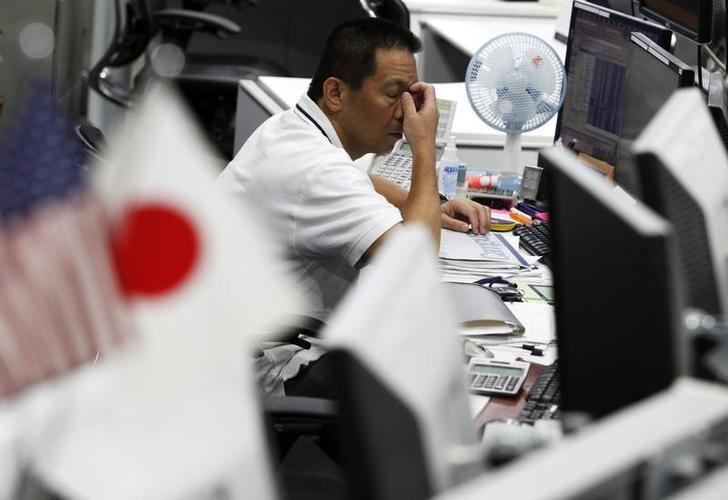
Asian shares slipped on Thursday as a surprise deterioration in German business morale rekindled fears of slowing global growth, while oil prices pulled back slightly after a sharp run-up earlier in the week.
The euro slumped to a 22-month low against the U.S. dollar overnight after the drop in German business confidence highlighted the divergence between data in the euro zone and the United States.
MSCI's broadest index of Asia-Pacific shares outside Japan eased 0.2 percent, while Japan's Nikkei average edged up 0.3 percent to 22,264.81 points.
Overnight, Wall Street shrugged off some earnings misses but drifted lower at the end of the session, after the S&P 500 and the Nasdaq Composite registered record closing highs on Tuesday.
Chotaro Morita, chief rates strategist at SMBC Nikko hopes that the Chinese economy is bottoming out have contributed to recent rallies in global equities.
"Corporate earnings that have been released so far suggests the worst period for the Chinese economy was over. While that is supportive of share prices, that alone is not enough to keep the rally going for more than a month," he said.
In the currency market, the dollar index, which measures the greenback versus a basket of six major rivals, rose to as high as 98.189 overnight, its highest level since May 2017. The index was last quoted at 98.133.
The euro sat at $1.1150, having suffered its biggest one-day loss against the dollar since early March.
The deteriorating reading on German business morale, in a survey by the IFO economic institute, bucked expectations for a small improvement.
The pound held at a two-month low, weighed down by a broad-based rally in the dollar and fading hopes of a breakthrough in Brexit talks between the British government and the opposition.
U.S. Treasury yields fell across maturities on Wednesday as investors piled into the safe-haven asset after a slew of weak international economic data.
A sharp slowdown in Australian inflation also lifted bond prices, while Premier Li Keqiang in China said authorities should not underestimate the difficulties in the Chinese economy, adding to concerns about global demand.
However, the U.S. yield curve steepened to its widest level since November at one time on Wednesday, in an expression of bullish sentiment.
Oil prices hovered below six-month highs after data showed U.S. crude stockpiles surged to their highest levels since October 2017, countering fears of tight supply resulting from OPEC output cuts and U.S. sanctions on Venezuela and Iran.
Brent crude futures fell 0.4 percent to $74.29 a barrel, while U.S. West Texas Intermediate crude futures dropped 0.5 percent to $65.57 a barrel. Both benchmarks hit 5-1/2-month highs on Tuesday.
The Bank of Japan is expected to keep monetary policy steady later on Thursday and predict that inflation will fall short of its 2 percent target for three more years, signaling that its massive stimulus will stay in place for the foreseeable future.
Investors are also awaiting the release of U.S. gross domestic product (GDP) data for the first quarter, due on Friday.








